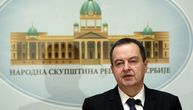Could new situation with Ukraine accelerate process of EU integration of Western Balkans?
Bearing in mind that Serbia has a central position and that development towards the Western Balkans practically depends on it, analyst Zoran Mlivojevic believes that it is quite certain that if the European Union decides to return to the enlargement policy, it will cover this area and in that way repair the consequences of the Ukrainian crisis.
The news that the president of France, Emmanuel Macron, in a telephone conversation with Aleksandar Vucic on Saturday, March 5, conveyed to the president of Serbia that, regardless of geopolitical changes in Europe and the world, Serbia unequivocally remains a key priority and the first candidate to join the EU, has been positively welcomed in the domestic media.
According to the president of Serbia, Macron said that neither Ukraine nor any other country will be in the EU before Serbia, and that Serbia, as a key country in the Western Balkans and the country that has advanced the most in negotiations, deserves to receive accelerated European integration.
The French presidency said that President Macron welcomed close cooperation between France and Serbia and stressed the clarity of the French position in international instances regarding the war in Ukraine and the need to respect the sovereignty of states, and that the war in Ukraine should be an opportunity for European rapprochement.
Analyst Zoran Milivojevic agrees that the new situation with Ukraine could speed up the process of European integration of the Western Balkans, and that in that case Serbia and Montenegro, countries that have already progressed far in that process, would be in focus. However, he is convinced that the EU will not make a political decision in the sense that Serbia's entry into the European Union will happen before the Kosovo issue is resolved.
"In that sense, there is nothing new. But it is likely that they will consider speeding up the process a bit, and we'll see that," Milivojevic told Telegraf.rs.
The analyst believes that this would be geopolitically very important for Europe and its future development, since it is expected that certain divisions in will occur in Europe after the Ukrainian crisis.
"The union now has a chance to fix what it has not done so far regarding the Western Balkans and to really attract this region to itself through the European integration process. That's the first thing. And the other thing about the Ukrainian crisis, is that these requests for joining the European Union from Ukraine, Georgia and Moldova have appeared. It's not realistic to expect that the EU will make a political decision regarding their accession for the simple reason that it is necessary for some processes to take place there. Those societies are still unsuitable for admission to the EU and reforms and other criteria must be met," Milivojevic assessed and added that in that sense, in the coming period, the Western Balkans has priority.
Bearing in mind that Serbia has a central position and that development towards the Western Balkans practically depends on it, analyst Zoran Mlivojevic believes that it is quite certain that if the European Union decides to return to the enlargement policy, it will cover this area and in that way repair the consequences of the Ukrainian crisis.
"In that case the EU should make this area a priority and take decisive steps for accession of these countries to the EU. Where, of course, I repeat, Serbia and Montenegro, which have progressed in that process, have absolute priority," Milivojevic concluded.
The vice president of the Center for Foreign Policy, Suzana Grubjesic, believes that it is high time to turn such positive signals into concrete deeds.
"Although all attention is focused on the war in Ukraine, it is necessary to take into account the Western Balkans, which has been rolling towards Brussels for two decades now. In that sense, there are signals, such as this message from Macron, that the European integration of the entire region, and especially Serbia, which has advanced in negotiations with the EU and is the central country in the Western Balkans, could finally be accelerated. I hope that, at least this time, we will move from words to deeds, because we have not needed motivating messages like we do now for a long time," Grubjesic told Telegraf.
(Telegraf.rs)

